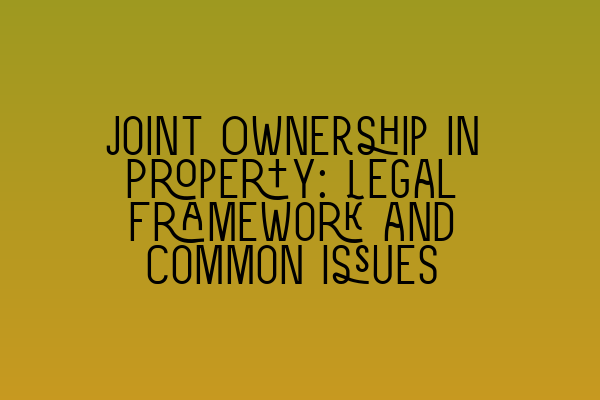Joint Ownership in Property: Legal Framework and Common Issues
Introduction
Joint ownership is a popular form of property ownership that allows multiple individuals to own a property together. It is commonly used in various scenarios, such as when couples purchase a home, friends invest in a property, or business partners acquire real estate. However, joint ownership can also lead to legal complexities and disputes if not properly understood and managed. In this article, we will explore the legal framework surrounding joint ownership in property and highlight some common issues that may arise.
Legal Framework
Joint ownership of property is typically governed by two types of ownership: joint tenancy and tenancy in common. Let’s take a closer look at each of these.
1. Joint Tenancy
In joint tenancy, each co-owner holds an equal and undivided interest in the property. This means that all owners have an equal share in the property, and if one co-owner passes away, their share transfers to the surviving co-owners. This transfer of ownership happens automatically and is known as the “right of survivorship.” The right of survivorship ensures that the property does not become part of the deceased co-owner’s estate and avoids the need for probate.
2. Tenancy in Common
Tenancy in common, on the other hand, allows co-owners to hold unequal shares in the property. Each co-owner has a distinct, proportionate, and transferable share, and there is no right of survivorship. This means that if one co-owner passes away, their share will be distributed according to their will or the rules of intestacy. Tenancy in common offers more flexibility as it allows co-owners to have different ownership percentages and sell or mortgage their individual shares independently.
Common Issues in Joint Ownership
While joint ownership can have many benefits, it can also give rise to certain challenges and disputes. Here are some common issues to be aware of:
1. Disputes Over Property Usage
One of the most common issues in joint ownership is disagreements over the use and occupation of the property. Co-owners may have different opinions on how the property should be used, whether it should be rented out, or who should have priority access. These disputes can often escalate and lead to legal action if not resolved amicably.
2. Financial Contributions and Responsibilities
Another issue that can arise is disputes over financial contributions and responsibilities. Co-owners may have different financial capabilities and expectations, leading to disagreements on who should contribute to mortgage payments, maintenance costs, and other expenses related to the property. Establishing clear agreements and responsibilities from the outset can help prevent these conflicts.
3. Selling or Transferring Ownership
There may come a time when one or more co-owners wish to sell or transfer their ownership in the property. This can be a complex process, especially if there are disagreements on the property’s value, the terms of the sale, or who should have the first right to purchase the shares. It is essential to have a clear process outlined in the initial agreement or seek legal advice to navigate these situations.
4. Legal Liabilities and Obligations
Co-owners can sometimes find themselves jointly liable for legal liabilities related to the property, such as mortgage arrears, property taxes, or legal disputes. Understanding each co-owner’s responsibilities and ensuring proper documentation and agreements are in place can help mitigate these risks and protect individual interests.
Conclusion
Joint ownership in property offers many advantages, such as shared financial burden and increased purchasing power. However, it is crucial to understand the legal framework and potential issues that may arise when entering into joint ownership. By being aware of these common issues and taking proactive steps to address them, co-owners can navigate joint ownership successfully and enjoy the benefits it has to offer.
Remember, if you’re facing any legal issues or require professional guidance regarding joint ownership, it is always advisable to consult with an experienced property law solicitor.
Related Articles:
– Misrepresentation in Contracts: Unveiling Deceptive Practices
– A Closer Look at SQE Contract Law Syllabus
– SQE Contract Law: Analyzing Landmark Cases and Influential Judicial Decisions
– Contract Law for Services: Key Considerations and Best Practices
– Understanding Contractual Capacity: Rights and Limitations
